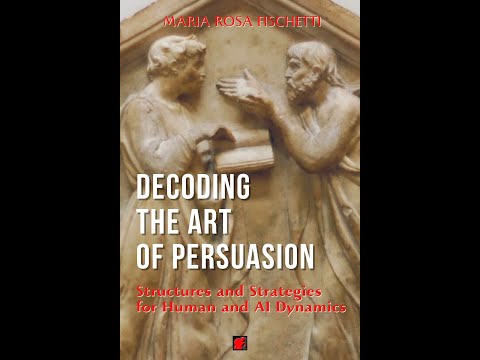Decoding the Art of Persuasion: Structures and Strategies for Human and AI Dynamics
Decoding the Art of Persuasion: Structures and Strategies for Human and AI Dynamics
Maria Rosa Fischetti
ISBN 9788899283285, Digital Index Publisher, Modena 2012
ENGLISH EDITION. BOOK ALSO AVAILABLE IN FRENCH AND ITALIAN
Digital version on sale in all digital bookstores and on:
... in fact, everyone, up to a certain point, is concerned with investigating some thesis and supporting it, defending themselves and accusing.
Although most do this spontaneously, some do it as a practice that comes from a disposition.
(...) Let us define rhetoric as the faculty of discovering in every argument what is capable of persuading.
Aristotle, Rhetoric, I.
The art of persuasion in modern language. Argumentative strategies dominate social interaction. From politics to advertising to theoretical discourse, we are faced with arguments that proceed on the basis of reasonable discourses, around probable premises, evaluating the acceptability of conclusions according to the nature of a historically and culturally situated audience.
It is indeed interesting to reflect on the meaning and fate of the ancient art of persuasion and its being on the eve of a metamorphosis.
In fact, every day, in our daily communication activities, we must be able to develop linguistic strategies to defend and have others accept our theses, but more often we must be able to analyze the reasoning of others to evaluate them and know whether to be convinced or not.
The study of this topic is no longer entrusted solely to philosophy, indeed we can certainly speak of an interdisciplinary approach. From logic, sociology, law, philosophy, semiotics, psychology, to linguistics and psycholinguistics, the interest in what today is called "argumentation" is great.
But it was only in the 1970s that argumentation became an object of study in linguistics. Experimental research on argumentation began in France and Neuchâtel.
George Vignaux (1976) is perhaps the first representative of the French-speaking world to be interested in this theme. Then Anscombre and Ducrot (1983). Vincenzo Lo Cascio (1991) is, finally, one of the few Italian authors who has contributed to psycholinguistic research on argumentation.
The problem, for those who want to deal with argumentation from a linguistic point of view, arises from the fact that even if in the past there was certainly no lack of rhetorical texts, the Greek world first and the Latin world later, left us numerous studies on this topic, and even if recently in Europe and the United States interest in this topic has been reborn, there are very few texts that deal with it from a purely psycholinguistic point of view.
This work fits into this perspective, in which argumentation is studied from the psycholinguistic point of view. Argumentation is analyzed as a cognitive process, both with regard to the subject who produces it, and with regard to the interlocutor, the recipient. The theme has been explored by dealing with all the fundamental points, but also analyzing the main theories that have been formulated on the subject.
Starting from the most general aspects, we arrived at the analysis of individual linguistic components, particularly important in an argumentative profile.
![[IT]](http://digitalindex.it/cdn/shop/files/01-arte-di-persuadere-it.jpg?v=1740430254&width=1445)
![[EN]](http://digitalindex.it/cdn/shop/files/02-Decoding-the-Art-of-Persuasion-en.png?v=1740430270&width=1445)
![[FR]](http://digitalindex.it/cdn/shop/files/03-L-ART-DE-LA-PERSUASION-fr.png?v=1740430289&width=1445)

![[IT]](http://digitalindex.it/cdn/shop/files/01-arte-di-persuadere-it.jpg?v=1740430254&width=1946)
![[EN]](http://digitalindex.it/cdn/shop/files/02-Decoding-the-Art-of-Persuasion-en.png?v=1740430270&width=1946)
![[FR]](http://digitalindex.it/cdn/shop/files/03-L-ART-DE-LA-PERSUASION-fr.png?v=1740430289&width=1946)


